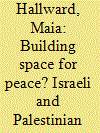|
|
|
Sort Order |
|
|
|
Items / Page
|
|
|
|
|
|
|
| Srl | Item |
| 1 |
ID:
090861


|
|
|
|
|
| Publication |
2009.
|
| Summary/Abstract |
This article investigates the limitations of peace theory in comparing and contrasting strategies adopted by activist groups working to resolve conflicts of varying types in varying contexts. Using the case of seven Israeli and Palestinian peace and justice groups that remained active after the collapse of the Camp David negotiations and the outbreak of the Second Intifada, the article illustrates the benefits of a process-based approach to peacebuilding for examining how, why, and to what extent approaches used by these groups changed between 2004-05 and 2008. The findings highlight how domestic, regional, and international changes have affected the operation of peace and justice activists, and suggest that those interested in progress towards a negotiated peace agreement should not assume that past policy instruments will work in the current environment.
|
|
|
|
|
|
|
|
|
|
|
|
|
|
|
|
| 2 |
ID:
119452


|
|
|
|
|
| Publication |
2013.
|
| Summary/Abstract |
While the immediate outcome of the Iraq War of 2003 was certainly to Israel's strategic advantage, the more immediate and indeed visceral challenge of the ongoing Al-Aqsa intifada has dominated the security horizons of most Israelis. The legacy of this conflict, with its strong Islamist overtones, has clearly had a bearing on how the Arab Awakening has come to be perceived by Israel.
Taking this experience as its starting point, this article examines the response by Tel Aviv to the Arab Awakening at an elite level and how, for the most part, Israeli perceptions of its Islamist essence, an essence that rejects popular accountability, continues to be viewed through a predominantly Realist prism. Such perceptions look set to endure, shaping Israel's immediate attitudes towards the Palestinians and the wider Arab world.
The authors argue that while Israeli concerns over the trajectory of the Arab Awakening do carry empirical weight, such concerns can be equally understood as part of a wider critique with regard to Israel's own emerging democratic deficit. This was seen most recently in a raft of legislative bills put before the Knesset between 2009 and 2012 designed to curb civil liberties in Israel; alongside its continued occupation of Palestinian lands and wider demographic shifts, such moves increasingly tarnish Israel's proud claim to be both Jewish and democratic.
|
|
|
|
|
|
|
|
|
|
|
|
|
|
|
|
| 3 |
ID:
192895


|
|
|
|
|
| Summary/Abstract |
Thirty years after its euphoric launch, the ‘Oslo peace process’ between Israel and the PLO stands as the worst calamity to have afflicted Israelis and Palestinians since the 1948 war, and the most catastrophic strategic blunder in Israel’s history. By replacing Israel’s control of the West Bank and Gaza Palestinians with corrupt and repressive terrorist entities that indoctrinated their subjects with burning hatred of Jews and Israelis, as well as murdered some 2,000 Israelis and rained thousands of rockets and missiles on their population centres, the Oslo process has made the prospects for peace and reconciliation ever more remote. By deflating the combative ethos of the Israel Defence Forces (IDF), it has weakened Israel’s national security and made the outbreak of a multi-front war a distinct possibility. By transforming the PLO (and, to a lesser extent, Hamas) into internationally accepted political actors without forcing them to shed their genocidal commitment to the Jewish state’s destruction, it weakened Israel’s international standing. And by deepening Israel’s internal cleavages and destabilising its sociopolitical system, it has created a clear and present danger to the Jewish State’s thriving democracy, indeed to its very existence.
|
|
|
|
|
|
|
|
|
|
|
|
|
|
|
|
|
|
|
|
|